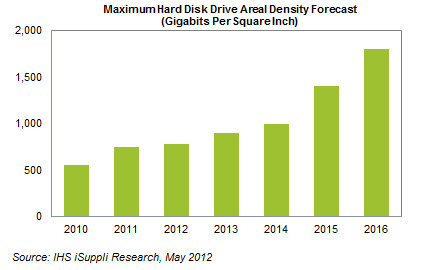IHS iSuppli has predicted in its Storage Space Market Brief report that during the five years from 2011 to 2016 maximum capacity in hard disk drives (HDD) will more than double. Storage giant Seagate also predicted earlier that it will be possible to make 60TB (TeraByte) hard drive by 2016, where laptop’s hard drives could reach 10TB to 20TB at the same time frame.
The research firm predicts that HDD data storage capacities will reach to a maximum 1,800 Gigabits (Gb) per square-inch per platter by 2016, which is up from 744 Gb per square inch in 2011. If you look at the figure above, you will see that from 2011 to 2016, the five years compound annual growth rate for HDD areal densities will be equivalent to 19 percent.
It is estimated that areal densities of HDD are to be reached 780 Gb per square-inch per platter in 2012 and next year it will reach 900 Gb per square-inch. Storage systems analysts Fang Zhang at IHS said, “Densities will double during the next five years, despite technical difficulties associated with the perpendicular magnetic recording (PMR) technology now used to create higher-areal-density hard disks. In particular, growth opportunities will lie in applications associated with mass enterprise storage requirements, gaming, and in digital video recorders (DVRs) where massive capacity is required to store high-definition video.”
Source: Isuppli
[ttjad keyword=”portable-hard-drive”]



Makes you wonder if you need all that storage when so many people are using services like Dropbox to store their data.
I am sure by 2016 sixty terabyte won’t seem too big anymore. History tells us that. And, cloud services will be far from taking over personal storage drives.